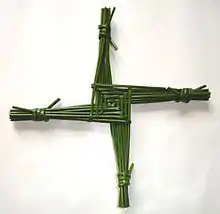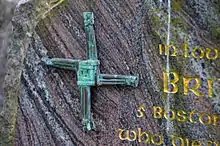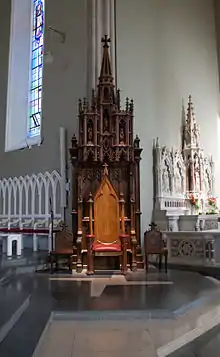Brigid's cross
Brigid's cross or Brigit's cross (Irish: Cros Bríde, Crosóg Bríde or Bogha Bríde) is a small cross usually woven from rushes. Typically it has four arms tied at the ends and a woven square in the middle. Historically, there were also three-armed versions.[1][2]

.JPG.webp)


Brigid's crosses are associated with Brigid of Kildare, one of the patron saints of Ireland. The crosses are traditionally made in Ireland on St Brigid's feast day, 1 February, which was formerly celebrated as a pagan festival (Imbolc) marking the beginning of spring. Many rituals are associated with the making of the crosses.[3] Traditionally they were set over doorways and windows to protect the home from any kind of harm.[4]
Origins
Celtic origins
The presence of Brigid's cross in Ireland is likely far older than Christianity. The Goddess Brigid was one of the Tuatha Dé Danann. Her feast day was the feast of Imbolc, and the cross made of rushes today is very likely the descendant of a pagan symbol whose original meaning may have been locally understood even into the early 20th century in rural Ireland. One remnant of that tradition in the meaning of the Brigid's Cross today is that it is said to protect a house from fire. This does not fit with any part of the Christian story of St Brigid, and so is likely a part of the older spiritual tradition behind the feast day.[5][6]
Christian origin story

In Christianity, St Brigid and her cross are linked together by a story about her weaving this form of cross at the death bed of either her father or a pagan lord, who upon hearing what the cross meant, asked to be baptised. One version goes as follows:
A pagan chieftain from the neighbourhood of Kildare was dying. Christians in his household sent for Brigid to talk to him about Christ. When she arrived, the chieftain was raving. As it was impossible to instruct this delirious man, hopes for his conversion seemed doubtful. Brigid sat down at his bedside and began consoling him. As was customary, the dirt floor was strewn with rushes both for warmth and cleanliness. Brigid stooped down and started to weave them into a cross, fastening the points together. The sick man asked what she was doing. She began to explain the cross, and as she talked, his delirium quieted and he questioned her with growing interest. Through her weaving, he converted and was baptised at the point of death. Since then, the cross of rushes has existed in Ireland. [7]
Symbol
To some extent, the Brigid's cross has become one of the symbols of Ireland, along with the shamrock and harp.[8] The Brigid's cross featured in the idents used for RTÉ Television, the state broadcaster, from the original 1960 design until the 1990s.[9][10][11] It was formerly the symbol of the Department of Health,[12] and remains in the logo of An Bord Altranais, the Irish Nursing Board.[13]
See also
References
Sources
Citations
- Ó Duinn, Seán. The Rites of Brigid. Columba Press, 2005. p.121
- Evans, Emyr Estyn. Irish Folk Ways, 1957. p.268
- "St. Brigid's Cross". www.unc.edu. Archived from the original on 1 July 2006.
- "Archived copy". Archived from the original on 22 December 2006. Retrieved 22 December 2006.CS1 maint: archived copy as title (link)
- Berger, Pamela (1985). The Goddess Obscured: Transformation of the Grain Protectress from Goddess to Saint. Boston: Beacon Press. ISBN 9780807067239.
- John T. Koch (2006). Celtic Culture: A Historical Encyclopedia. ABC-CLIO. p. 287. ISBN 978-1-85109-440-0. Retrieved 14 March 2013.
- "Cross & Crucifix: St. Brigid Cross". Https. Archived from the original on 22 December 2006. Retrieved 29 January 2018.
- Kennedy, Brian P. (Spring 1992). "The Failure of the Cultural Republic: Ireland 1922–39". Studies: An Irish Quarterly Review. Irish Province of the Society of Jesus. 81 (321): 14–22: 17. JSTOR 30091646.
- "Mailbag: New RTÉ Symbol Does Not Please All". RTÉ Archives. RTÉ.ie. 1987. Retrieved 11 December 2015.
- "History- at a glance" (PDF). RTÉ Facts and Figures. RTÉ. Retrieved 11 December 2015.
1960: RTÉ's logo, a St Brigid's cross, designed by Richard Butterworth is published.
- Ryan, Vera (2003). Movers and Shapers: Irish Art Since 1960. Collins. p. 198. ISBN 9781903464380.
- O'Riordan 1951, p.91
- "Celebrating 50 Years Regulating Intellectual Disability Nursing". ABA News. Irish Nursing Board. 21 (4): 1, 3: 3. Winter 2009. Archived from the original on 22 December 2015. Retrieved 11 December 2015.
St. Brigid, whose cross is the logo of An Bord Altranais
External links
| Wikimedia Commons has media related to Cross of Saint Brigid. |
- St. Brigid's Cross
- Archived 2018-10-17 at the Wayback Machine
